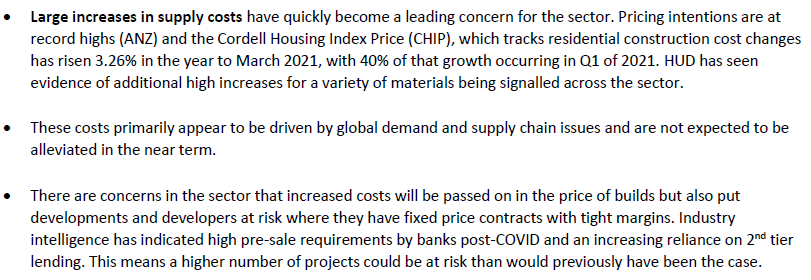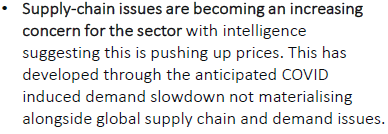





 Hastings place-based approach: progress report to 31 March 2021 (BRF20/21040925)
Hastings place-based approach: progress report to 31 March 2021 (BRF20/21040925)
the 1982
Housing Market Update May 2021
Act
under
Housing Market Update – May 2021 (IREQ20/21050939)
Released
Information
Housing Market Dashboard – April 2021
Official

the 1982
Act
under
Released
Information
Official

AH 21 024
31 March 2021
Minister of Housing
Associate Minister of Housing (Public Housing)
cc: Vui Mark Gosche, Board Chair
Construction Materials Supply Chain – Risk and Management
Purpose
This paper provides information on the current situation concerning the supply chain of
construction materials and products in New Zealand
Background
The COVID-19 pandemic has had a serious impact on global manufacturing, supply
chains and logistics. The resulting trade imbalance is impacting imports to New Zealand
for all goods and materials. The current boom in construction activity in New Zealand is
adding an additional constraint to the market, as demand is far exceeding forecasts and
available supply.
Impact of COVID-19 on global supply chains and logistics
Countries across the globe have experienced COVID-19 outbreaks at different times as
the pandemic spread from its epicentre and, consequently, introduced lockdowns, and
halted economic movements and production. The impacts of this have resulted in
constraints in supply due to:
reduced productivity
the flow of imports and exports changing
the impact on the flow of shipping movements.
Interruptions to production caused large numbers of shipping containers to be stranded at
ports leading to carriers reducing the number of vessels out at sea. This situation
continues, with international shipping volumes considerably reduced.
Global Container Shortage
There is currently a global shortage of shipping containers due primarily to a severe trade
contraction in the first half of 2020 that led to the cancellation of sailings. Increased
economic activity in China in the second half of 2020 resulted in a resurgence in trade
demand as well as the peak period demand for goods in western markets due to
Christmas and New Year holidays.
However, demand for American and European goods from Asian markets has been weak,
meaning that most containers worldwide are stranded in European and American ports.
The result of this has been a worldwide logistics backlog and empty containers not being
where they are needed. The limited access to containers is, in turn, driving up the cost of
new containers.
Auckland Port Congestion
The Ports of Auckland is currently operating only three of its eight ship-to-shore cranes
during the day (two at night) due to a labour shortage. It is currently seeking to recruit five
crane operators from overseas but it is unknown when the first candidates wil arrive in
New Zealand. Completion of the Ports of Auckland terminal automation project, due at the
end of March 2021, has also been delayed due to freight processing taking priority.
As a result, container ships are waiting at sea for 10 to 14 days to unload at Auckland;
shipping lines are reducing their calls to Auckland; some are imposing Auckland
congestion charges on import containers; and shipments can be re-directed to other ports,
with little or no notice, if the shipping lines do not want to wait to be unloaded.
Other factors
Other factors affecting supply chains include:
industrial action at Australian ports
shipping cost increases of between 150 – 400 per cent as shipping lines focus
traffic on the most profitable
increased air freight costs due to reduced inbound flights to New Zealand
reduced or non-production due to COVID-19 distancing measures in
manufacturing operations
unprecedented and unexpected demand from the construction sector boom in New
Zealand
supplier decisions prior to COVID-19 – for example, James Hardie manufacturing
moved from Penrose and now all in Australia.
Kāinga Ora – Homes and Communities response to Carter Holt Harvey structural
timber supply changes
Timber is in short supply across New Zealand due to high demand. This has resulted in
significant price increases to timber products and lead times extending.
Kāinga Ora is supporting its build partners to work with their suppliers in order to ensure
continued supply of structural grade timber.
Kāinga Ora spoke to all its major suppliers Monday 29 March 2021 following the Carter
Holt Harvey announcement to cut its supplies of structural grade timber to Mitre 10 and
ITM.
In summary, while Carter Holt Harvey is a major supplier of timber products, suppliers
have other options in terms of mil s that also produce this timber.
It is too early to say what the impact of current shortages wil be on our national build
programme. We are recommending our build partners place orders well in advance in
case of delays. We wil continue to monitor this changing situation and wil offer any
assistance we can to our partners.
2
Suez Canal Supply Chain impact
Current advice from Kāinga Ora National Supply Agreement partners is that the Suez
Canal blockage (where the EverGiven became wedged and was re-floated a week later
on Monday 29 March 2021 NZT) is unlikely to have impact on the supply chain in near
future.
The ship was on its way North; however, the knock-on effect of the canal being blocked
for over a week is a significant traffic jam of ships awaiting passage in both directions.
The Kāinga Ora National Supply Agreement Partners have advised that ample stocks are
on hand of materials sourced and products manufactured in the Northern Hemisphere.
The situation is being closely monitored and alternate products wil be sourced, if required.
Risks to Kāinga Ora construction programmes
Collective supply chain continuity risks and impacts are highly likely to result in increases
in the cost of materials to Kāinga Ora and could result in project delays and costs
escalations. The cost of imported products or products that require imported components
are likely to rise.
Products sourced from off-shore, which have previously been viewed as a lower cost
alternative, may become uncompetitive when compared to local y sourced products due to
dramatic logistics costs increases. The main risks for new construction are currently
product availability for exterior timber, timber floor joists, and electrical cable used for
power and lighting; increased lead times for some cladding; and supply of raw materials
for paint products.
Kāinga Ora contracts materials supply for maintenance activities using National Supply
Agreements (NSAs) and these contracts and stock forecasts are actively managed. The
Maintenance and Retrofit programmes make effective use of these contracts and
forecasting of activities for suppliers reduces the risk of supply shortages. In the current
environment, contracted NSA suppliers are holding additional stock. Although this adds
considerable risk to their balance sheets, they are not approaching Kāinga Ora for any
support at this point in time.
Mitigation
Kāinga Ora is working closely with suppliers, manufacturers, and distributors to reduce the
risks as far as possible. This includes ongoing intelligence gathering, supplier liaison, and
mitigation planning.
Our Procurement team is providing regular updates to our Maintenance and Build
Partners, based on information received from shipping companies; product suppliers and
their suppliers; and market intelligence. The information shared is supporting Kāinga Ora
scenario planning for the possibility that the situation dramatical y worsens, and
discussions regarding possible responses to project delays and impacts, and
opportunities to support suppliers, if required.
Next steps
If the current demand for construction products continues at the same or increased level,
there wil be a heightened need for increased levels of forward forecasting both from
Kāinga Ora and our Build Partners to ensure supply wil be available when needed.
3


Kāinga Ora wil continue to monitor the supply market and work through possible solutions
to both shorter and longer term supply constraints, such as alternative products, improving
forecasts and communication, and increasing stock levels.
Andrea Morton
Director Procurement and Supplier Management
Caroline McDowal
General Manager Commercial
4
 From:
From:
Fiona Montgomery
To:
EXT Iain Duncan
Subject:
response - Urgent feedback required
Hi Iain
Please see below in response to your earlier request of today.
Kāingā Orā – Homes ānd Communities response to Cārter Holt Hārvey decision
· Timber is in short supply across New Zealand due to high demand. This has resulted in
significant price increases to timber products and lead times extending.
· Kainga Ora is supporting its build partners to work with their suppliers in order to ensure
continued supply of structural grade timber.
1982
·
the
Kainga Ora spoke to all its major suppliers this morning following the Carter Holt Harvey
announcement to cut its supplies of structural grade timber to Mitre 10 and ITM.
· In summary, while Carter Holt Harvey is a major supplier of timber products, suppliers have
other options in terms of mills that also produce this timber.
· It is too early to say what the impact of current shortages will be on our national build
programme. However, we are hopeful that any impact will not be significant. Act
· We are recommending our build partners place orders well in advance in case of delays. We will
continue to monitor this changing situation and will offer any assistance we can to our partners.
· Our Procurement Team has a good relationship with Carter Holt Harvey management. We will
under
also keep in contact with them, as needed.
Regards
Fiona
cid:image001.jpg@01D60678.5EB46090
Fionā Montgomery
Senior Advisor
Mobile: s 9(2)(a)
Information
Government Relations
Email: [email address]
People, Governance and Capability
Released
Freephone: 0800 801 601 | Mainline: (04) 439 3000 | Kainga Ora - Homes and Communities
PO BOX 2628 Wellington 6140 | New Zealand Government |
www.kāingāorā.govt.nz
REQUEST
From: Iain Duncan <[email address]>
Sent: Monday, 29 March 2021 1:19 PM
To: GRU Jobs <[email address]>; Rachel Kelly <[email address]>
Subject: Urgent feedback required
Importānce: High
Official
Hi all
Further to the news over the weekend that Carter Holt Harvey is cutting timber supplies to Mitre 10,
Bunnings and ITM etc will this have any impact on the work being done by Kainga Ora and is KO hearing
anything from partners and stakeholders about this situation and how it is impacting on them?
The Minister would like an urgent update on this situation as soon as possible, as she may be asked by
media around this topic today.
Many thanks.
Iain
Iāin Duncān |
Private Secretary (Housing)
[email address] DDI: 04 817 9782 Cellphone: s 9(2)(a)
Office of Hon Dr Megān Woods
Minister of Housing
| Minister of Energy and Resources
| Minister of Research, Science and Innovation
the 1982
Private Bag 18041 | Parliament Buildings | Wellington 6160 | New Zealand
Office Phone: +64 4 817 8705 Email: [Megan Woods request email]
Act
under
Released
Information
Official
Document Outline











